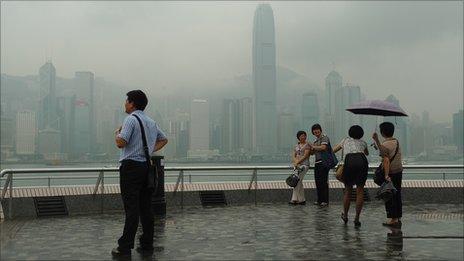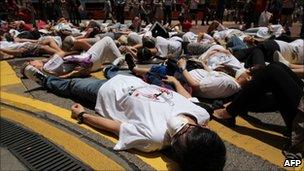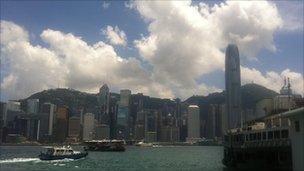Pollution clouds Hong Kong's future
- Published

Visibility in Hong Kong is often affected by pollution
To gaze across Hong Kong's harbour to the city's famed skyline of shimmering skyscrapers and lush, green peaks is to experience one of the world's most spectacular urban landscapes.
When you can see it.
Hong Kong's "fragrant harbour", from which the city takes its name, is often obscured by smog.
The city's air pollution regularly exceeds levels recommended by the World Health Organisation and by some estimates air quality is three times worse than London or New York.
Much of the air pollution is generated by the coal-fired power plants and smoke-stacks across the border in China's industrial south, but the traffic fumes from the city's increasingly congested streets also play a large role.
"When I first arrived it was almost as though I could reach out and touch the mountains on the other side of the harbour," says Rob Chipman, the boss of relocation firm Asian Tigers and the chairman of the American Chamber of Commerce, who has lived in Hong Kong for 25 years.
"It was such a visual treat."
The city's worsening air quality is making it harder for businesses to retain and hire international staff, eroding Hong Kong's appeal as a place to live and work.
A survey of more than 200 international and local companies operating in Hong Kong released in May by the office space provider Regus, suggests that three out of four companies said that the poor air quality was making it harder for them to attract and retain employees from overseas.
It's not just the wealthier expats that are put off by the poor air quality.
A poll by think tank Civic Exchange in December found that one in four Hong Kong residents is considering emigrating because of air pollution - close to two million people.
Brain drain?

Hong Kongers want the government to do more to improve air quality
To be sure, there is not a mass exodus of workers from Hong Kong because of the poor air quality.
The economy is thriving on Hong Kong's position as gateway to China. Equally common complaints from companies seeking to attract international staff are sky-high rents and a lack of international school places.
But air pollution does make a difference, particularly in industries such as banking where there are similar jobs in nearby cities like Singapore that have much better air quality.
Australian Sara Foster moved to Singapore from Hong Kong with her toddler son and husband in May and says the difference in air quality is tangible.
Her husband, who works long hours outdoors as a tennis coach, no longer needs to use medication to control his asthma.
"Air pollution was definitely a factor in our move, besides education and job opportunities," she says.
"You don't get that heavy smog hanging over the city the way we did in Hong Kong."
In the American Chamber of Commerce's latest survey of its members published in January, 68% said air pollution had worsened over the past 12 months and 48% knew of professionals and their families leaving Hong Kong in pursuit of cleaner air.
Room for improvement
There are few signs that Hong Kong's air pollution is improving.
The city's air pollution index was at the "very high" level - above 101 on the government's own air pollution index (API) - for 34% of the time during January to March, compared with 11% in the same period in 2010.
At "very high" levels, children, the elderly and those with heart problems are advised to stay indoors.
And campaigners claim Hong Kong's API is more than 20 years old and permits pollution levels two to four times greater than the maximum levels recommended by WHO guidelines.
Vivian Lee, a 45-year-old receptionist, says her family decided to move to Lantau, one of Hong Kong's less densely populated islands to escape the poor air.
"It's really terrible in the city with all the buses and the tall buildings. We wanted to be where the air is fresher," she says.
In April, according to satellite data analysed by Hak-kan Lai, an assistant professor at the University of Hong Kong, the city has some of the worst air quality in the world.
It ranked fourth worst for air quality out of 17 cities, trailing Guangzhou, Macau and Bangkok.
"It's only a snapshot but it's really alarming that our air quality is worse than Beijing and Shanghai," Mr Lai says.
Blame game

Hong Kong's skyline on a clear day
Officials have long blamed factories in China for the city's dirty air, particularly in autumn and winter when prevailing winds blow from the north.
But environmentalists say much of the problem lies closer to home.
Arthur Lau, a researcher at the Hong Kong's University of Science and Technology, says the city is the main source of its own pollution around half the time, with roadside pollution the main culprit.
Hong Kong has many green areas, with 40% of land reserved for nature conservation and recreation.
But this means most of the city's seven million residents live and work in less than 25% of the land that is developed, leading to one of the highest traffic densities in the world - 275 vehicles per kilometre.
Roadside pollution is also magnified by a street canyon effect created by the wall-like, high rise buildings that line many of the city's roads.
Yet the city has no congestion charge or road pricing scheme such as those found in London or Singapore.
Progress?
However, some progress has been made.
The government says it is likely to meet a target to cut emissions of major pollutants, by at least 20% from 1997 levels, by 2010 - largely by retro-fitting the city's largest coal-fired power plant with emission control devices.
And a law banning drivers from idling engines will take effect in September after 10 years of debate.
But critics say that the law, which allows for 20 exemptions, will do little to ease roadside pollution, which is caused by trucks and buses with outmoded engines.
Drivers caught parked with their engines running will be fined 320 Hong Kong dollars (£26; $41) but the ban will be suspended during very hot or stormy weather.
Cab drivers at taxi stands will also be exempt, as will buses and school vans - and drivers will also be able to idle their engines for three minutes every hour without being charged.
"It will make only a marginal difference, if any," says Joanne Ooi, of Clean Air Network, a pressure group.
"The government has been weak on this issue and needs to do much, much more if it wants to keep the city competitive in the long term."
- Published1 December 2010